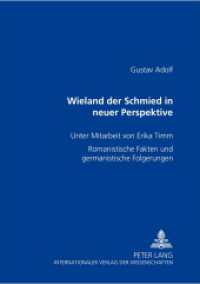Full Description
Research into instrumental music practice has a long history dating back to the 1940s. This book presents papers dating from 1995 to 2022 by Prof. Susan Hallam, a former professional musician and instrumental teacher who on becoming an academic continued her interest in instrumental music by researching the factors contributing to the development of high levels of expertise, including practice. The papers variously explore issues relating to the importance of practice in acquiring musical expertise as opposed to having inherited musical ability; how practicing strategies develop from beginner instrumentalists through to the professional level; the management of practice; and the high levels of motivation required to develop expert musical skills. They illustrate the use of a wide range of different research methods, qualitative and quantitative. The book concludes with examples of successful instrumental music teaching at the primary school level and creative instrumental music making in the secondary school classroom. It differs from existing books that focus on practical guidance on practicing, as it presents the academic research underpinning this guidance. As an expert musician and researcher in psychology and education, Susan Hallam brings a personal and academic perspective to the study of the development of expertise.
Contents
Introduction
Part 1: Musical Ability
1. Conceptions of Musical Ability
2. 21st Century Conceptions of Musical Ability
Part 2: The Development of Musical Expertise
3. The Predictors of Achievement and Dropout in Instrumental Tuition
4. The Development of Expertise in Young Musicians: Strategy Use, Knowledge Acquisition and Individual Diversity
5. What Predicts Level of Expertise Attained, Quality of Performance, and Future Musical Aspirations in Young Instrumental Players?
6. Transitions and the Development of Expertise
7. Transitions and the Development of Expertise: Update 2021
8. Conceptions of Musical Understanding
Part 3: How Do Professional Musicians Practice
9. Professional Musicians' Orientations to Practice: Implications for Teaching
10. Professional Musicians' Approaches to the Learning and Interpretation of Music
11. The Development of Memorisation Strategies in Musicians: Implications for Education
12. The Development of Metacognition in Musicians: Implications for Education
Part 4: Practice in Young Musicians
13. The Development of Practising Strategies in Young People
14. Are There Gender Differences in Instrumental Music Practice?
15. Are There Differences in Practice Depending on the Instrument Played?
Part 5: Musical Motivation
16. Musical Motivation: Towards a Model Synthesising the Research
17. Gender Differences in Musical Instrument Choice
18. Changes in Motivation as Expertise Develops: Relationships with Musical Aspirations
19. Gender Differences in Musical Motivation at Different Levels of Expertise
20. Relationships between Practice, Motivation, and Examination Outcomes
Part 6: Promoting Musical Motivation in Formal Educational Contexts
21. What Contributes to Successful Whole-Class Ensemble Tuition?
22. Supporting Musical Progression for Children from Very Disadvantaged Communities Participating in the English 'In Harmony' Program
23. Pupils' Perceptions of Informal Learning in School Music Lessons
24. Teachers' Perceptions of the Impact on Students of the Musical Futures Approach
25. The Perceptions of Non Music Staff and Senior Management of the Impact of the Implementation of the Musical Futures Approach on the Whole School
26. Can the Adoption of Informal Approaches to Learning Music in School Music Lessons Promote Musical Progression?








